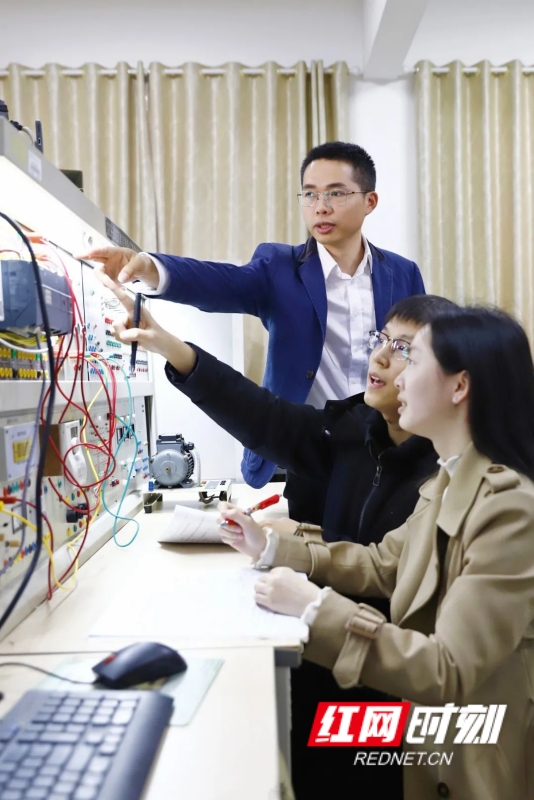
In 2003, Chen Chaoyang enrolled as an undergraduate student at HNUST (Hunan University of Science and Technology). He later pursued studies in automatic control engineering at Guangxi Normal University and Huazhong University of Science and Technology.
Today, Chen is recognized as a leading talent at HNUST, serving as the Associate Dean of the School of Information and Electrical Engineering and holding the prestigious position of Chief Scientist for China's Key Research and Development Program of China, among other roles.
Chen Chaoyang started from HNUST and returned to his alma master to make a significant impact.
He majored in mathematics during his undergraduate studies, which provided a solid foundation for his subsequent research. The in-depth research on the disciplinary system during his doctoral studies deepened his understanding and fueled his passion for scientific research.
Throughout his research career, Chen has been influenced by three mentors.
At the postdoctoral stage, Chen worked under the guidance of Gui Weihua, the academician of the CAE (Chinese Academy of Engineering) and a professor at Central South University. From Professor Gui, Chen absorbed the importance of persistence in tackling bottleneck challenges, an endeavor that spanned a decade. He realized three important points of scientific research. Firstly, scientific research needs ambition and courage to undertake substantive work. Secondly, it needs a robust foundation and stores of knowledge and finally it should aim to resolve major scientific research problems that align with the nation’s major national strategies.
"We will research whatever the country needs." This encapsulates the understanding that Chen gained from Wang Yaonan, an academician of the CAE and a professor at Hunan University. Wang Yaonan was Chen's mentor in the Hunan Talent Program. And under Wang's guidance, Chen shifted his focus from theoretical research to practical application research. Chen said that Academician Wang's research has stimulated his potential in cluster systems and other areas. The complex networks he studied have a wide range of applications in joint rescue and seabed resource exploration.
The third person was his mentor during his further studies at Boston University in the United States, who helped him expand his international perspective. He stated that this mentor guided him on how to think critically, how to spark inspiration, and how to solve underlying scientific problems.
The imperceptible influence of the three mentors is now reflected in Chen's own mentorship of students. He believes that the spirit of how to approach scientific research and how to be a good person and do things needs to be inherited.
Over the years, Chen has been committed to dealing with difficulties in complex network and carrying out research into its behavior, performance and related application within the context of multifaceted network communication.
In his laboratory, there are several different drones, a source network load storage distributed new energy power generation and a micro grid system. All of them are used to validate the theoretical scheme of the semi-physical pan energy platform. Ten cabinets can simulate various nodes, such as photovoltaic power generation, battery energy storage, etc.
In 2021, Chen led a Key Project of Inter-Government International Science and Technology Innovation Cooperation of National Key R&D Program---Research on Reliability Operation Mechanism and Key Technologies of Multi-energy Interconnected Incomplete Information Power Grid. This is the first National Key Research and Development Plan Project launched by HNUST in the 14th Five-Year Plan period. It is also a major Nonprofit research concerning the national economy and people's livelihood. It is of great significance to improve the core competitiveness of the industry and the overall independent innovation ability, and provides important support for the reliable and stable operation of China's large power grid.
"The system in the laboratory allows us to verify different schemes and ideas," said Chen. And as for the power grid, if a "point" is wrong, and there may be a fault in a very far place, or even result in a major accident, such as the blackout in Italy, which can have substantial economic repercussions.
Chen is not only focused on preventing errors in complex networks, but he also believed that "errors" can be used in reverse. He said, "For example, can I find a way to dismantle a virus network faster? In social networks, what is the nature of rumors spreading so fast?"
With a deep understanding of numerous nodes and intricate relationships, Chen's mathematical basis has played an important role in his scientific research career. He believes that "we should analyze it through theoretical methods and use the algorithm of natural science to calculate the relationship between all elements."
Recently, Chen has been engaged in applying the system to air-sea submersible exploration, focusing particularly on aspects of energy security, including island energy grid and ocean energy replenishment.
(Translated by HU Zhuojun and WANG Jiayi)